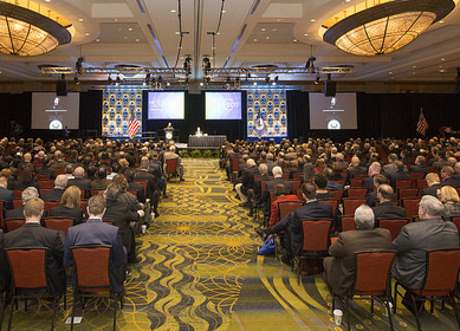Svinicki promises continued improvement at NRC
16 March 2017
The US Nuclear Regulatory Commission (NRC) will work continuously to optimise, adapt and evolve to meet its regulatory responsibilities, Kristine Svinicki said yesterday in her first address as NRC chairwoman to the agency's 29th Regulatory Information Conference in Bethesda, Maryland.
 |
| Svinicki addresses the 29th Regulatory Information Conference (Image: NRC) |
Svinicki has been an NRC commissioner since 2008 and was appointed as chairwoman in January, succeeding Stephen Burns who remains as one of the NRC's three currently serving commissioners. Two commissioner positions are currently vacant.
She said the principles of good regulation - independence, openness, efficiency, clarity and reliability - remained central to the NRC. While the agency remained focused on and committed to delivering its safety and security mission in efficient and agile manner, this did not mean "contentment with the status quo," she said.
"In a changing world our mission remains unchanged, but our means to achieve this mission must be continually optimised, adapted and evolved based on changing conditions and expectations," Svinicki said. She highlighted work done by the NRC over the past year to enhance the efficiency and predictability of the reactor licensing process. The NRC is implementing $48 million of savings under its long-running Project Aim efficiency initiative, she said.
Questioned about the expected impact on the NRC from executive orders from the US administration, including one requiring agencies to eliminate two existing rules for each new rule created, Svinicki said the NRC, while an independent regulator and not subject to that order, would also look at the "spirit and intent" of such orders. "The Agency has been taking a very systematic look at the executive orders as they have been issued," she said.
On the potential impacts of NRC budget cuts and the new US administration's "foreign policy posture" on the NRC's international cooperation and assistance activities in coming years, Svinicki said she was confident the NRC would continue to be able to "pursue and collaborate on the most important measures before us". While government agencies could be expected to have to consider a "tighter prioritisation" of activities, "the core of [NRC] collaboration will certainly continue," she said.
Researched and written
by World Nuclear News